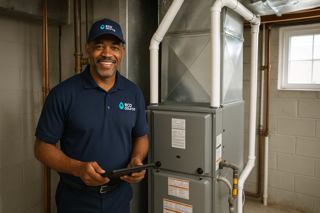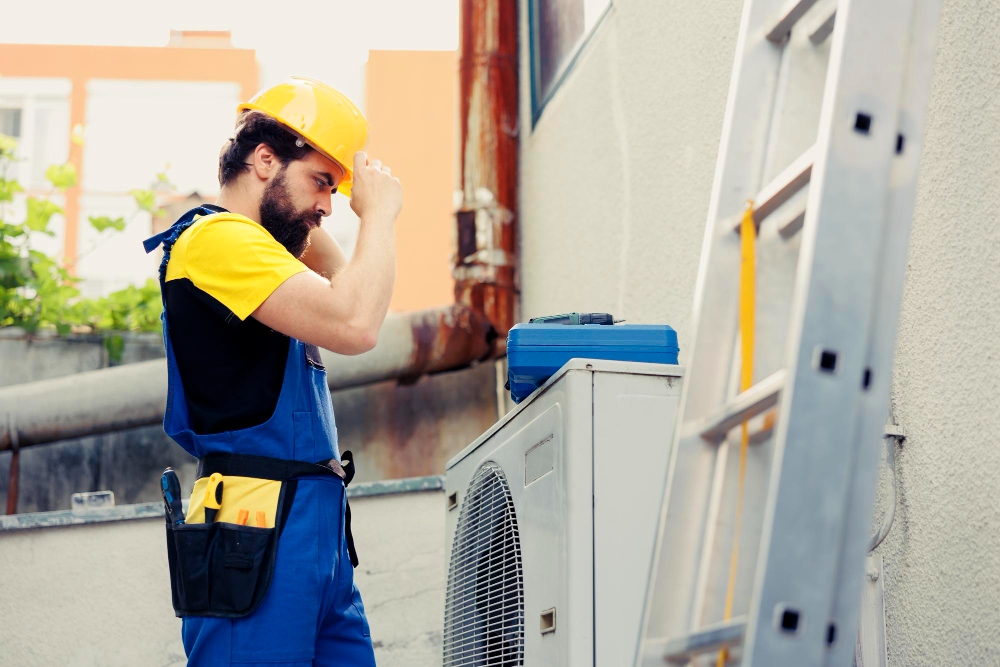
Clean Energy HVAC Upgrades | Sustainable Home Heating
Think about this: You’ve invested in solar, swapped out lightbulbs for LEDs, and upgraded your windows. But what about your HVAC? For environmentally conscious homeowners, the heating and cooling system is often the last—but most impactful—piece of the clean energy puzzle.
You don’t have to be a climate activist to care about your carbon footprint. Many high-income households today are motivated by long-term impact, home value, and wellness. Upgrading to a clean HVAC system checks all the boxes: efficient, quiet, healthier, and better for the environment.
Transitioning to clean energy solutions begins with the systems that power your home—especially your HVAC system. Traditional heating systems that run on fossil fuels like oil or gas are major contributors to greenhouse gas emissions. Upgrading to an electric heat pump is one of the most impactful changes you can make to reduce your carbon footprint.
Heat pumps are powered by electricity, and when paired with renewable energy sources like solar panels, they can operate almost entirely emission-free. Even when powered by the standard grid, they produce significantly fewer emissions than gas or oil systems.
By upgrading your HVAC system, you’re not only improving indoor air quality and comfort—you’re also aligning with Massachusetts’ clean energy goals. According to the MassCEC, every home that switches to electric heating helps reduce statewide carbon emissions and dependence on fossil fuels.
Whether you're building new, renovating, or simply replacing an outdated system, now is the time to consider clean HVAC technology. Government incentives and rising energy costs make this transition more affordable and urgent than ever.
Key Search Terms: clean energy HVAC, environmentally friendly heating, how to reduce home carbon footprint, sustainable HVAC solutions
References:
- https://goclean.masscec.com/clean-energy-solutions/air-source-heat-pumps/
- https://www.energy.gov/energysaver/heat-pump-systems
Latest News & Blog
View All
Learn the Basic Steps to Install the Heat Pump
If you are looking to upgrade to a more effective, all-year- round heating and cooling system for your home, knowing the Heat Pump Installation Timeline can help you plan better.

Ductless Mini-Splits | Energy-Saving Comfort for MA Homes
Mini-splits offer zoned comfort, quiet operation, and energy savings—perfect for renovations and additions. Explore benefits and rebate options.

HVAC Rebates in Massachusetts | Save Up to $16,000
Discover the rebates, tax credits, and financing options available for heat pump systems. Don’t miss out on big savings for energy-efficient upgrades.

Clean Energy HVAC Upgrades | Sustainable Home Heating
Upgrade to a clean, electric HVAC system and reduce your home’s carbon footprint. Learn about eco-friendly heat pump solutions in Massachusetts.

Cold Climate Heat Pumps | Reliable Heating for Massachusetts
Cold climate heat pumps work even in freezing temps. Learn how to heat your home efficiently and access up to $16,000 in Mass Save rebates.

Top 5 HVAC Energy Efficiency Tips for Massachusetts Homes
Maximize HVAC performance with five proven energy-saving tips, including heat pumps, smart thermostats, and duct upgrades. Save energy and money.





.webp)